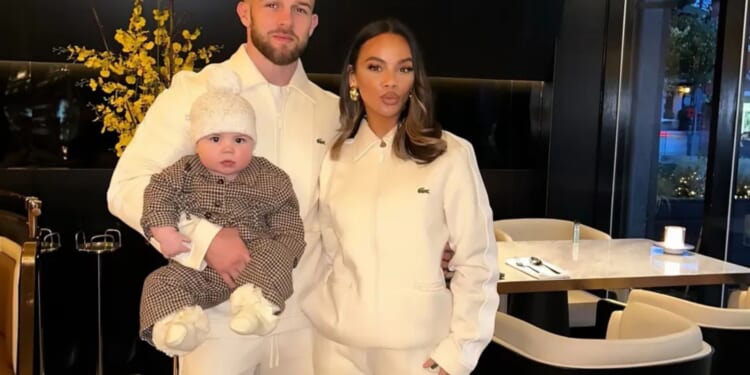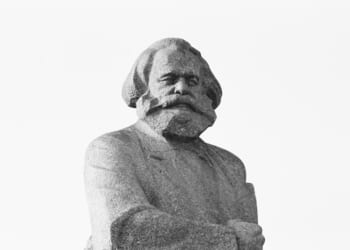Awesome, gruesome, beautiful in equal measure and deeply emotional, the final ceremony in the great 80th anniversary commemorations of the Second World War came to a tearful conclusion on Friday.
For a few hours at least, the dwindling band of veterans of the Far East were no longer ‘forgotten’ but centre stage alongside the King, the Queen, ministers, diplomats and hundreds of very proud families on live television.
The fact that the national event to remember Victory in Japan – VJ – Day had only been arranged in the last few weeks and on a fraction of the budget and scale of those other titanic landmarks, D-Day and VE Day, came as no surprise to this lot.
Still, at least they were having their day in the sun – which was relentless. However, if any group were not going to grumble about the 84 degree heat at the Royal British Legion service at the National Memorial Arboretum in Staffordshire, it was the old boys with the Burma or the Pacific Star on their blazers.
As we heard in several haunting first hand accounts, the oppressive heat, along with the monsoons and the tropical diseases, were every bit as deadly as the enemy.
‘Imagine you’ve never been able to have a wash or a bath or a change of clothing for 12 months,’ remarked Thomas Jones, a 103-year-old ex-Royal Artillery bombardier from Salford, on the giant screen.
‘And on top of that, you had to fight the Japanese!’ That brought one of the loudest laughs in a service which had its lighter moments amid the tales of brutality.
A natural raconteur, Mr Jones went on: ‘You never saw them until they were attacking you. I saw this Japanese officer. He’s got his sword and he’s running straight at me, and I’m thinking to myself, “this is my last day”.
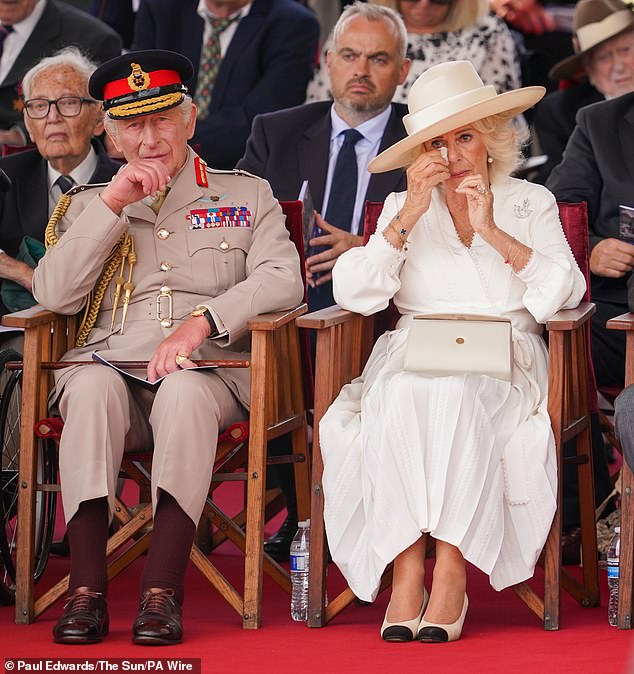
King Charles and Queen Camilla were moved to tears by the powerful first-hand testimony of VJ veterans as they spoke at a service of remembrance this afternoon marking 80 years since the end of the Second World War
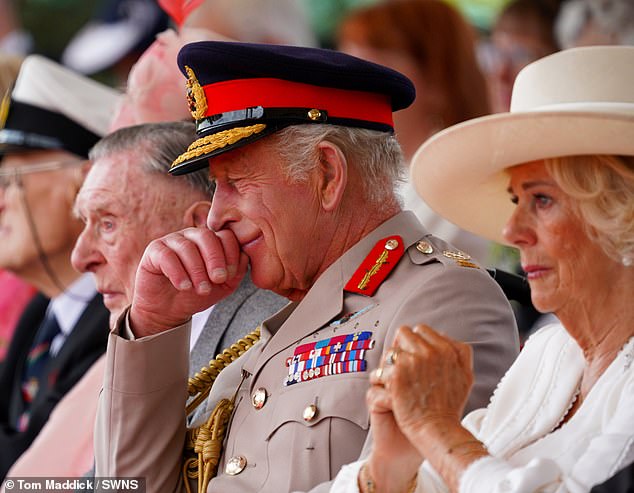
King Charles held back tears during the service
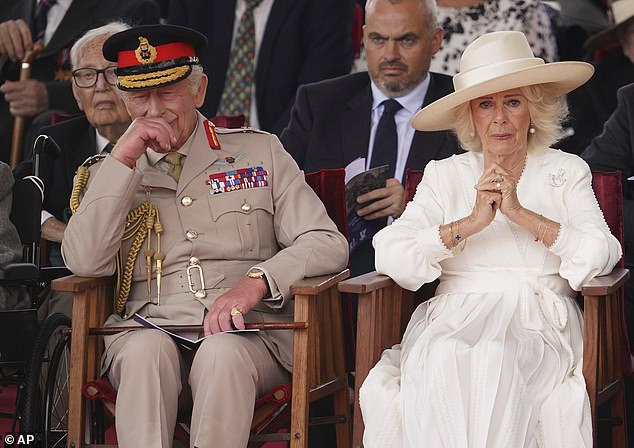
The pair appeared visibly emotional after a veteran went ‘off-script’ to salute the monarch during the VJ Day service today
‘Well, all of a sudden, a Gurkha soldier came round the back of me and shot him. The Gurkhas – the greatest!’
At which point, the narrator, the actress Celia Imrie informed us that, unlike most of the veterans in these video testimonies, this one was not sitting in the royal box.’
‘The remarkable Thomas Jones sadly died yesterday afternoon,’ she announced softly.
Audible sighs rippled through an audience of 500. Most were families, like Pat Crisp, 75, daughter of Major Richard Clarkson-Littleford of the South Wales Borderers, reduced to tears by a triple flypast from the immortal trio of Messrs Spitfire, Hurricane and Lancaster.
Her proudest moment, she told me, was hearing his men tell her: ‘The Major never left anyone behind.’
Alongside me sat former London truck driver, Bill Smith, 78.
He was wearing the tropical uniform of his father, Sergeant Reg Smith of the Chindits, the Special Forces unit dropped deep inside enemy territory to hit the Japanese from behind.
‘They always felt forgotten because they were told not to talk about if after the war,’ Mr Smith explained.
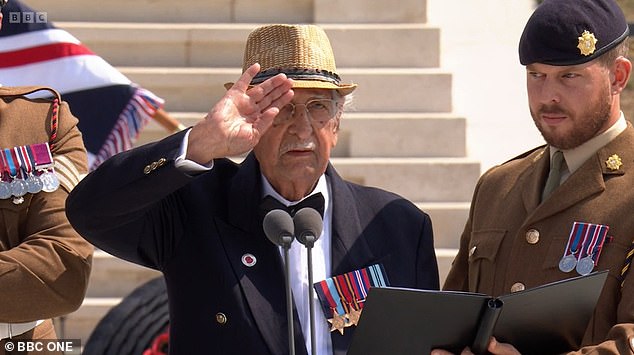
Captain Yavar Abbas (pictured) went ‘briefly off-script’ to salute ‘my brave King’ for attending despite ongoing cancer treatment
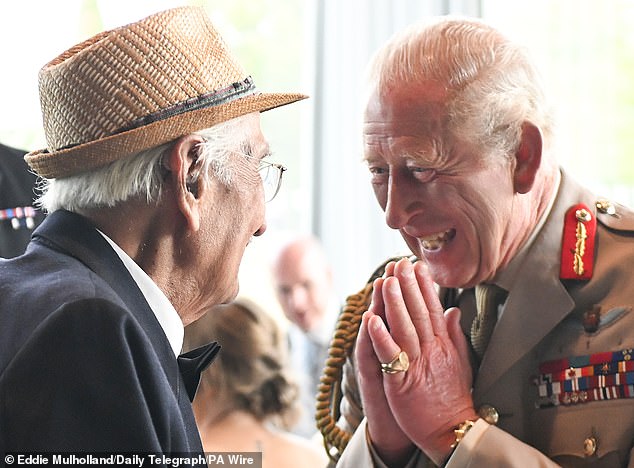
King Charles with Mr Abbas
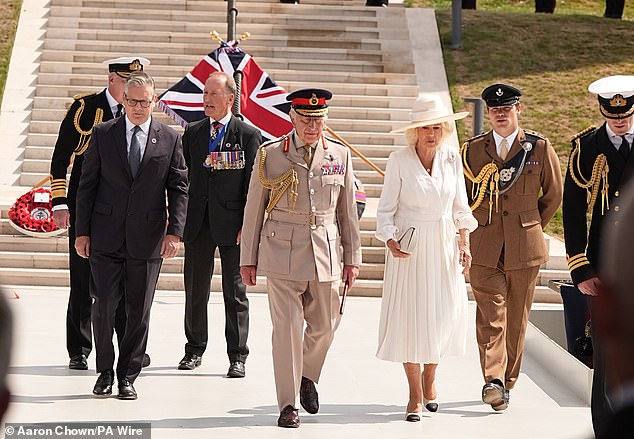
Prime Minister Sir Keir Starmer, King Charles III and Queen Camilla arrive for the national Service of Remembrance
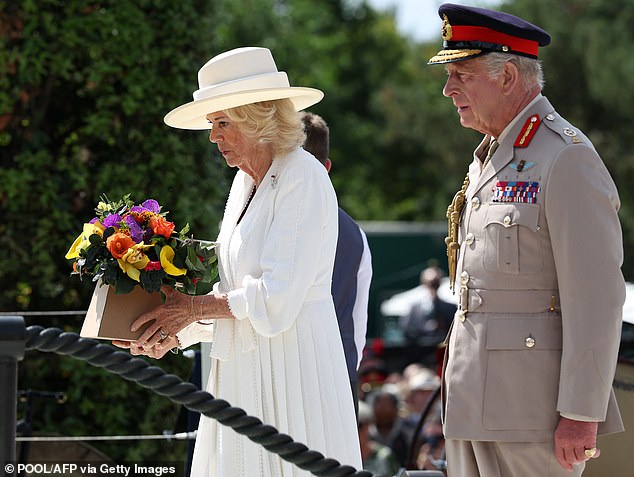
The Queen lay a posy, including jasmine, marigold, orchids, tropical orchid, yellow trumpet, hibiscus, vanda miss orchid, rhododendron and golden wattle
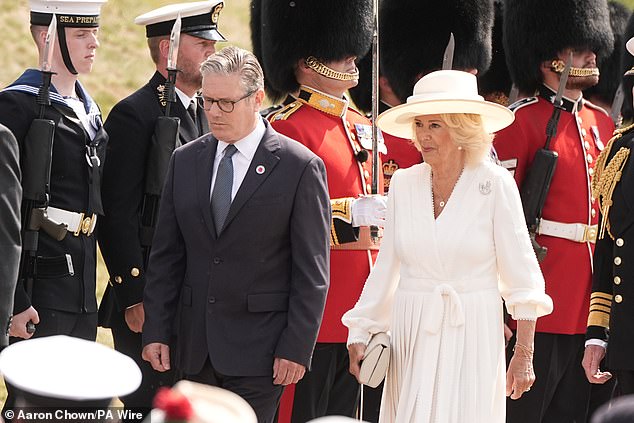
Prime Minister Sir Keir Starmer and Queen Camilla during the national Service of Remembrance, hosted by the Royal British Legion in partnership with the Government
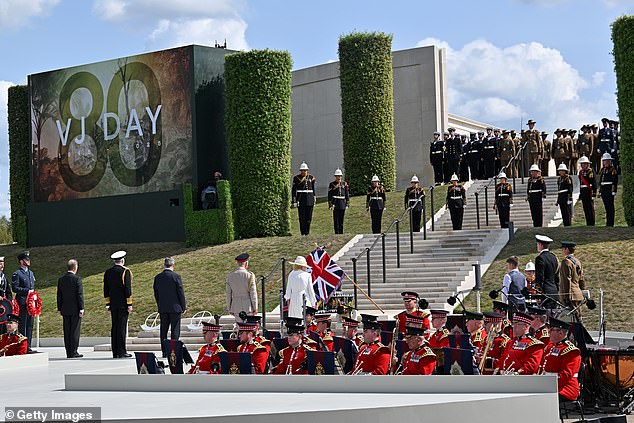
For a few hours at least, the dwindling band of veterans of the Far East were no longer ‘forgotten’ but centre stage alongside the King, the Queen, ministers, diplomats and hundreds of very proud families on live television
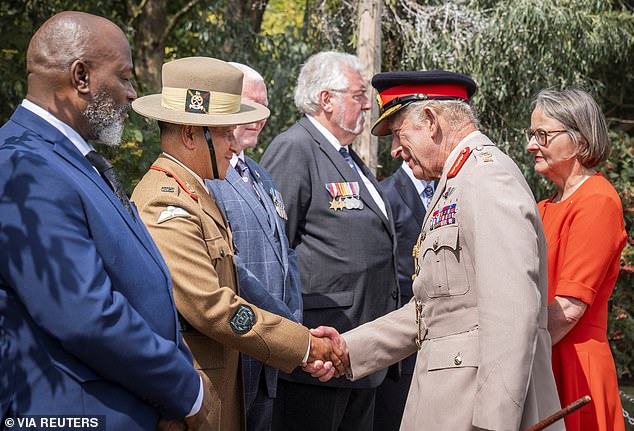
King Charles III greets Silas Ackah Sarbah and Warrant Officer Class Two, Khadak Bahadur Chhetri
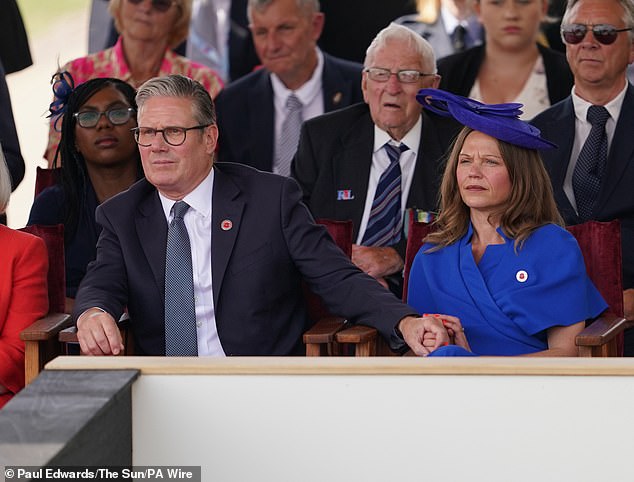
Prime Minister Sir Keir Starmer and wife Lady Victoria Starmer during the national Service of Remembrance
‘They didn’t want the relatives of the dead to know how awful it was.’
Even on Friday, their words were being tempered. The actor, Robert Lindsay, read out the stories of two Chindits, Sid Machin and Charlie Richards, who were seated bashfully in the front row just along from the Prime Minister.
‘As we neared the end of our time in Burma, death became an every day occurrence, with bodies to bury almost every evening,’ one recalled.
A military minder later told me that the organisers had omitted a grittier revelation: that the glider pilots carrying them to their landing zones knew that they were on target once they picked up the overpowering stench of dead Japanese bodies.
There was also a delightful, impromptu moment in a ceremony which was, by now, cheerfully wreaking havoc with its timings. The writer and film-maker, Yavar Abbas, a former officer in the 11th Sikh Regiment and looking two decades younger than his 105 years, stepped up on stage to read from his war diary.
‘I apologise for briefly going off the script…’ he began. Cue frantic twitching among officials, for whom going ‘off-script’ in front of the King and the PM on live television is heresy.
Mr Abbas went on: ‘….to salute my brave King – who is here with his beloved Queen.’
Reminding us that the monarch is undergoing treatment for cancer, he said that ‘if it provides any comfort’, he himself had been clear of the disease for 25 years.
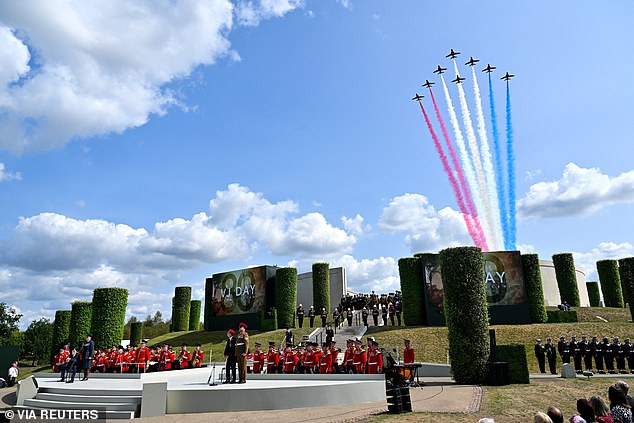
The aerobatic display team of the Royal Air Force, The Red Arrows fly overhead during the service
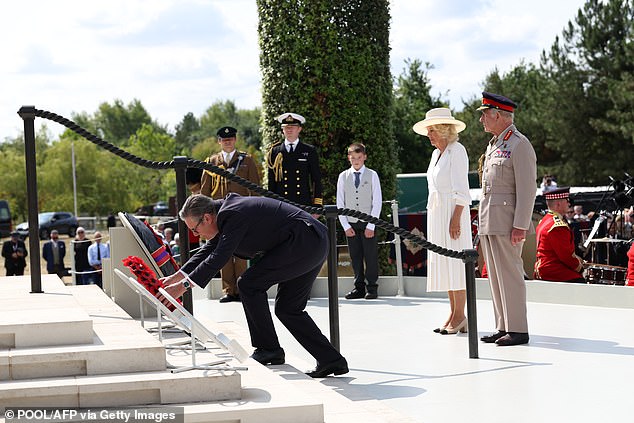
Prime Minister Keir Starmer lays a wreath during a national service of remembrance at the National Memorial Arboretum in Alrewas
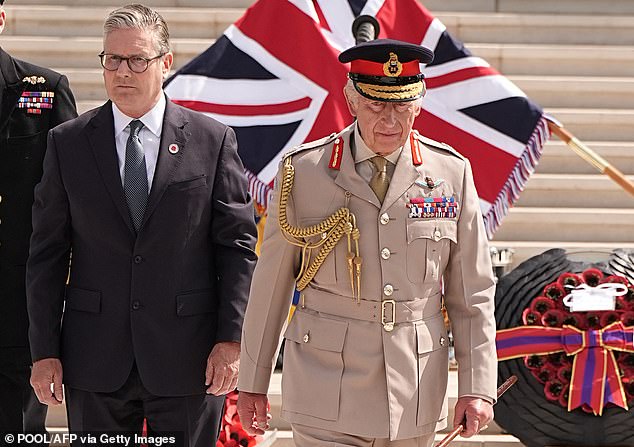
Britain’s King Charles III and Britain’s Prime Minister Keir Starmer
‘And I salute him because, by his presence here, he has gone a long way to make sure his granddad’s 14th army is never given the sobriquet again of a “forgotten” army.’
To which the King, beaming away, raised a clenched-fist in agreement.
Mr Abbas proceeded to read out his diary entry on narrowly cheating death when two comrades were killed alongside him. As he had written in his diary: ‘I hope I will live to do better things.’
Visibly moved by all this, the King and Queen stood up to shake his hand warmly. Queen Camilla spent the service sitting next to former Royal Navy submarine telegraphist, John Harlow, 100, whose tribute to his pal Mark Webber, lost without trace in HMS Porpoise, had people around me welling up.
All around the Arboretum, there were fresh messages on wreaths and crosses to a late father or grandfather. Running through the day were two themes.
First, was the fact that this had been a true Commonwealth victory, with troops from India, Australia, Africa and elsewhere outnumbering the British.
Earlier, the King had reflected on this in his message to the nation: ‘Countries and communities that had never before fought together learned to co-ordinate their efforts across vast distances, faiths and cultural divides. Together they proved that the greatest weapons of all are not the arms you bear, but the arms you link.’
More so than at any previous national VJ Day event, there was also a marked Japanese presence.
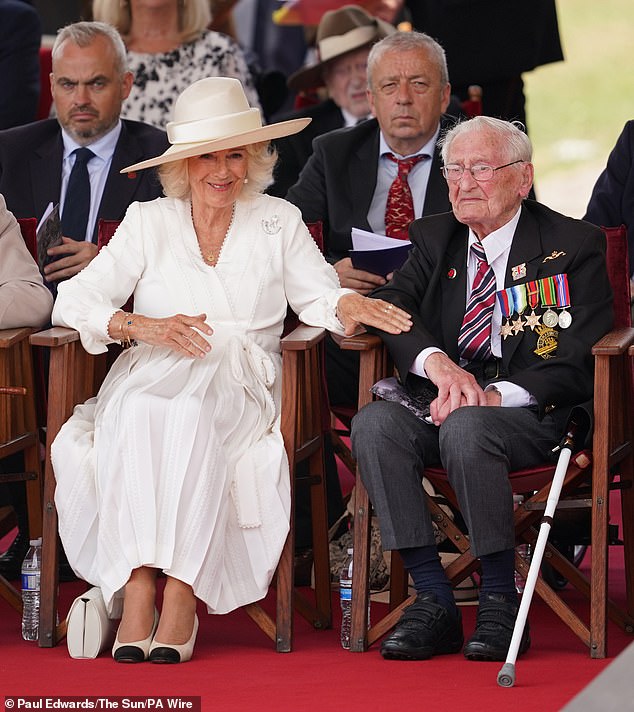
Queen Camilla spent the service sitting next to former Royal Navy submarine telegraphist, John Harlow, 100 (right)
I met Akiko Macdonald, daughter of a Japanese officer who fought the British at the great battle of Kohima. He survived the war, was shunned by some back home for having done so, turned to drink and hardly ever talked about it.
Married to a Brit, Akiko is now chair of the Burma Campaign Society, which promotes UK-Japanese reconciliation, and was here with a wreath.
Also present was the Japanese Ambassador, Hiroshi Suzuki, who, for the first time, laid a wreath at the main monument to the fallen of the Far East, the Burma Railway Memorial.
He bowed deeply several times, hands clasped. It turned out that he had respectfully sought permission for doing so in advance, which had been duly granted by the handful of remaining holders of the Burma Star (just 15 of them as of Friday).
Their association chairman, Viscount Slim, grandson of the heroic General ‘Bill’ Slim, was present and shook his hand.
‘That would not have happened even ten years ago, let alone when my grandfather was alive,’ he reflected later.


